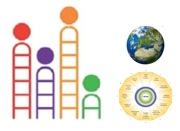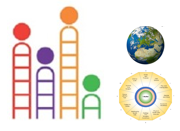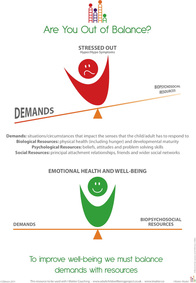Stress in Schools: Who is responsible and why it matters
As a practising clinical psychologist and experienced teacher I have become increasingly concerned about the levels of stress I am observing amongst my education colleagues in schools. This last half term it seems that staff are more stressed than ever before and we are just at the beginning of the school year.
Teachers are by and large an extremely conscientious and hardworking bunch. My concern is that the expectations of what class teachers and senior leaders should be able to achieve have grown and grown and grown, to beyond what is reasonable and healthy. The resulting imbalance between the demands of the role in hand and the capacities or resources that the class teachers and senior leaders available to them is seriously out of balance for too many.
Symptoms of stress arise when there is an imbalance between demands and resources: As anyone who starts to study the content covered in the Level 1 I Matter Courses, will quickly come to appreciate, it is quite clear that excessive imbalance between demands and resources can lead to predictable physiological and psychological impact on children and on adults. One of the most important of these is that stressed adults and children all tend to become more reactive, and impatient and intolerant. This is of particular concern when those same stressed adults are interacting with highly reactive and stressed children and parents.
There is some amazing practice in our schools with committed staff seeking to offer every child an opportunity for an education. Learning I Matter principles can really help a lot. However, there comes a point with too much top down pressure to deliver results that are out of line with what these same professionals, children and parents can realistically manage, then what I have seen is that the child can become the barrier to the teacher and school delivering the required results.
The personal and professional impact of excessive demands In this content, the sheer level of stress I observe that is being experienced by too many schools in connection with the Ofsted process is an indicator of something that is seriously out of touch with the reality and needs of what is actually happening. I am appalled when I get to hear about yet another experienced head teacher or class teacher reaching total breaking point, but in the last months I have been hearing these stories more and more often. I think this is a result of an unfair and unreasonable amount of pressure on adults who deserve our support.
Not only are some personal tragedies involved for highly committed individuals, but this relentless pressure on already committed adults has in my view very serious potential impact for our most vulnerable young people. What these young people need more than anything is time to develop within the context of supportive emotionally attuned relationships with adults who are not overwhelmed. Learning to relate to other people takes time and is very difficult to learn if the task demands are developmentally insensitive and the people being interacted with are pushed to breaking point.
My greater concern is that these issues played out in the classroom with our young people have really long-term significant impact. When children who have significant delays in their social-emotional development are not given time to learn these skills because the curriculum is insensitive to the need, and when the teachers are being pushed and pushed to deliver literacy and numeracy results regardless of their pupils capacity and readiness for such formalised adult led learning, the result is not neutral. The consequence of such a mismatch will inevitably be felt in too many stressed and disengaged young people who are difficult to teach, and genuinely do not understand themselves or other people, having little or any motivation to learn.
Symptoms of stress and the issue of diagnosis The symptoms of stress are observable in quite specific patterns of brain functioning characterised by much more immature long lasting functioning. The symptoms are those that commonly come to be described with psychiatric labels: anxiety, depression, ADHD, ASD, ODD. The labels do not adequately highlight what is really happening but it is serious because these same difficulties mean that that the given young person is likely to be much less employable and much more likely to have difficulties in their own adult relationships.
I believe that this dynamic is a vital player in the rising concerns about child mental health, challenging behaviour, and crime statistics. Importantly these dynamics cannot be addressed through more and more pressure to deliver unrealistic educational results.
What's the alternative? What is needed in my view is a collective step back and a reconsideration of what we are observing. What is needed is policies and practices that give much better appreciation of child development and the adult role in the developing brain. It needs us to wake up to the extent of the real difficulties experienced by so many children in our schools in their social-emotional development and to think hard about what really needs to happen.
We as adults need to make some changes.
This project wants to campaign on these issues so if you have ideas about how this could be achieved please contact us or join a course click here
Copyright CBetoin2015 All Rights Reserved.
Teachers are by and large an extremely conscientious and hardworking bunch. My concern is that the expectations of what class teachers and senior leaders should be able to achieve have grown and grown and grown, to beyond what is reasonable and healthy. The resulting imbalance between the demands of the role in hand and the capacities or resources that the class teachers and senior leaders available to them is seriously out of balance for too many.
Symptoms of stress arise when there is an imbalance between demands and resources: As anyone who starts to study the content covered in the Level 1 I Matter Courses, will quickly come to appreciate, it is quite clear that excessive imbalance between demands and resources can lead to predictable physiological and psychological impact on children and on adults. One of the most important of these is that stressed adults and children all tend to become more reactive, and impatient and intolerant. This is of particular concern when those same stressed adults are interacting with highly reactive and stressed children and parents.
There is some amazing practice in our schools with committed staff seeking to offer every child an opportunity for an education. Learning I Matter principles can really help a lot. However, there comes a point with too much top down pressure to deliver results that are out of line with what these same professionals, children and parents can realistically manage, then what I have seen is that the child can become the barrier to the teacher and school delivering the required results.
The personal and professional impact of excessive demands In this content, the sheer level of stress I observe that is being experienced by too many schools in connection with the Ofsted process is an indicator of something that is seriously out of touch with the reality and needs of what is actually happening. I am appalled when I get to hear about yet another experienced head teacher or class teacher reaching total breaking point, but in the last months I have been hearing these stories more and more often. I think this is a result of an unfair and unreasonable amount of pressure on adults who deserve our support.
Not only are some personal tragedies involved for highly committed individuals, but this relentless pressure on already committed adults has in my view very serious potential impact for our most vulnerable young people. What these young people need more than anything is time to develop within the context of supportive emotionally attuned relationships with adults who are not overwhelmed. Learning to relate to other people takes time and is very difficult to learn if the task demands are developmentally insensitive and the people being interacted with are pushed to breaking point.
My greater concern is that these issues played out in the classroom with our young people have really long-term significant impact. When children who have significant delays in their social-emotional development are not given time to learn these skills because the curriculum is insensitive to the need, and when the teachers are being pushed and pushed to deliver literacy and numeracy results regardless of their pupils capacity and readiness for such formalised adult led learning, the result is not neutral. The consequence of such a mismatch will inevitably be felt in too many stressed and disengaged young people who are difficult to teach, and genuinely do not understand themselves or other people, having little or any motivation to learn.
Symptoms of stress and the issue of diagnosis The symptoms of stress are observable in quite specific patterns of brain functioning characterised by much more immature long lasting functioning. The symptoms are those that commonly come to be described with psychiatric labels: anxiety, depression, ADHD, ASD, ODD. The labels do not adequately highlight what is really happening but it is serious because these same difficulties mean that that the given young person is likely to be much less employable and much more likely to have difficulties in their own adult relationships.
I believe that this dynamic is a vital player in the rising concerns about child mental health, challenging behaviour, and crime statistics. Importantly these dynamics cannot be addressed through more and more pressure to deliver unrealistic educational results.
What's the alternative? What is needed in my view is a collective step back and a reconsideration of what we are observing. What is needed is policies and practices that give much better appreciation of child development and the adult role in the developing brain. It needs us to wake up to the extent of the real difficulties experienced by so many children in our schools in their social-emotional development and to think hard about what really needs to happen.
We as adults need to make some changes.
This project wants to campaign on these issues so if you have ideas about how this could be achieved please contact us or join a course click here
Copyright CBetoin2015 All Rights Reserved.
Categories
- About this blog (1)
- Relationship Health (1)
- Impact Stories (7)
- Nuggets and GEMS (1)
- Audio (1)
- Videos (1)
- Professionals (43)
- Parents-Carers (4)
- Young People (2)
- Workplace (1)
- Schools (4)
- Health (5)
- Theory to Practice (13)
- Recent Feedback (9)
- Why I Matter? (8)
- Miscellaneous (18)
- 2019 (14)
- 2018 (5)
- 2016 (4)
- 2015 (6)
- 2014 (23)
- 2013 (8)



0 comments
Leave a comment
Please log in or register to post a comment